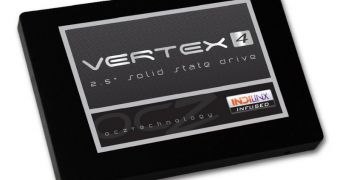Last month we learned that, like the DRAM market, the NAND Flash memory segment was suffering from reduced demand, which only strategic supply cuts managed to compensate for, to some extent.
Thus, it came as a surprise to hear that OCZ Technology Group, one of the major suppliers of SSDs (solid-state drives), suffered from insufficient supply of NAND Flash memory, rather than oversupply.
Then again, since OCZ doesn't manufacture its own NAND chips, it makes sense that the aforementioned decision on the part of Toshiba, and other producers, could have negative effects.
The company reported its financial situation for the second quarter of its fiscal year 2013, which ended on August 31, 2012.
Due to insufficient supply of chips for Agility and Vertex SSDs, revenues will be of around $110 to $120 million, instead of $130-140 million as previously forecasted.
According to exchange rates, that's 87-95 million Euro instead of 102-111 million Euro, give or take a few hundred thousand.
"During the month of August we experienced a significant shortage on certain NAND flash components, based on industry wide tightening of supply, leaving OCZ with an undersupply of the 20nm-class MLC NAND used in our Vertex and Agility Line of products," said Ryan Petersen, chief executive officer of OCZ Technology.
"While we believe that the situation will resolve itself, subject to market conditions, we plan to hasten our transition to new process nodes in order to help ease these supply constraints."
OCZ's shares have been fluctuating over the past three months, although, to be fair, this situation isn't solely to blame. There were rumors of a possible acquisition by Seagate as well (still unconfirmed).
Regardless, if many other SSD makers report shortages of NAND shipments, it may become apparent that manufacturers of flash chips shouldn't have deliberately cut back on production quite so much. Alas, the need, and desire, to keep prices stable has prevailed thus far, even though the world has been clamoring for cheaper SSDs for years.

 14 DAY TRIAL //
14 DAY TRIAL //